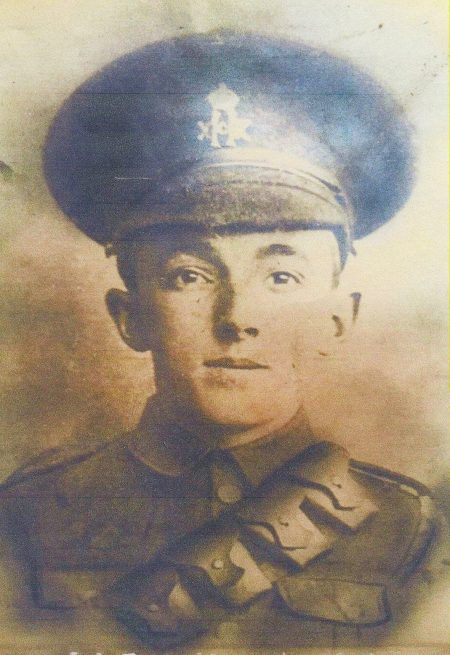
Robin Snook provided this information about his great uncle, Robinson Tweedy.
3412/200048 Private Robinson Tweedy of the Yorkshire Regiment went to war with his younger brother, Charles from their home in Kirkby Fleetham. He was wounded in February 1916 near Ypres, receiving a gun shot wound to the abdomen. He was honourably discharged and returned home. he died on 14 December 1918 from his wound and laid to rest in Great Fencote’s churchyard.

Medical record detailing Robinson’s injury

Robinson Tweedy’s medal card
Explore more memories from the ribbon
-
Lt Henry Stanley Tempest Bullen
Jennifer Bullen visited the museum to show us the memorial plaque to Lt Henry Stanley Tempest Bullen, her father-in-laws elder brother. Harry Bullen of ‘D’ Battery, 251st Brigade of the Royal Field Arilltery was Killed in Action on 14th April 1917 during the Battle of Arras (an action launched in support and as a diversionary action to the larger French offensive on the Chemin des Dames). He died at the age of 20 and is buried south of Arras at Beaurains Road Cemetery, which was designed by Sir Edwin Lutyens. His mother, Edith Bullen lived in Gosforth, Northumberland. A memorial window to Lt Bullen was erected in St Nicholas Church, Gosforth following the war.
-
Henry Barningham Simpson
Alan Simpson, a resident of Richmond called into the musueum to tell us about his grandfather. After months of collecting stories from the time of the First World War for the Ribbon of Remembrance, we have our first story relating to our rural location. Henry Barningham Simpson farmed at High Rockliffe Farm Hurworth during the First World War. He was also given the role of official horse buyer to the War Department during the conflict. Alan Simpson recalled, “I know he had to travel to very many farms selecting the best of the cart horses to pull the guns and carts of the army. My dad told me that he hated having to take the farmers best and most useful horses. He knew very well that a lot would be killed or injured from the shelling, ‘blown to pieces’ were his actual words. I suppose he was given some leeway in selecting which horses to buy as food still had to be produced, how they were selected he never said but I suppose they had to be fit for purpose whether they be cart horses or hunters for the cavalry”. The requisitioning of horses during the First World War was dealt with by the Army Remount Service. This department existed before the conflict broke out, with a total establishment of 25,000 horses and mules, five Remount Depots and four Remount companies, with a strength of approximately 1,200 animals. Within 12 days, the establishment had been increased to 165,000 animals and…
-
Bill Moore
At over six feet tall and 22 stone, Bill Moore must have been an impressive sight! While originally from Wells, he made his way to the north of England with his travelling boxing booth. For a time he set up at Darlington, but at the outbreak of war in 1914, Moore decided to move his show to Catterick Camp. The ‘Tommies’ must have enjoyed what he had to offer. Boxing matches even involved Annie, his daughter and a captive bear which on one occasion escaped onto local moorland. Military Police eventually tracked the animal down, much to the relief of the locals.
